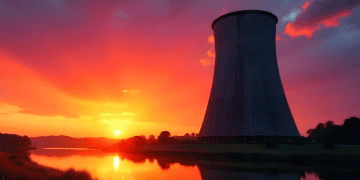Indiana lawmakers are currently discussing several bills that aim to introduce small modular nuclear reactors (SMRs) to the state’s energy system. Supporters of these bills believe they are crucial for meeting the growing energy needs, especially as many data centers require a lot of power. However, consumer advocates are worried about the financial impact on residents and the early stage of SMR technology.
Overview of Proposed Legislation
The proposed legislation includes House Bill 1007 and Senate Bills 423 and 424. These bills suggest financial incentives, like a 20% tax credit for companies working on SMR projects, and allow utility companies to charge consumers for development costs before fully approving projects. Representative Ed Soliday, who created HB 1007, insists that Indiana needs to diversify its energy sources to stay competitive and provide reliable power for upcoming industrial projects.
Reasons for Considering SMRs
Supporters point out that SMRs can offer stable, low-carbon energy, making them a promising alternative to traditional fossil fuels. The expected arrival of energy-heavy data centers from large tech companies increases the urgency to broaden Indiana’s energy options. Mark Nichol from the Nuclear Energy Institute mentions that though developing SMR projects may take time, proactive legislation is essential to avoid energy shortages in the future.
Consumer Concerns and Financial Risks
On the flip side, consumer and environmental groups warn against rushing into SMR adoption, highlighting the untested nature of the technology and significant financial risks involved. Kerwin Olson, the Executive Director of the Citizens Action Coalition, cautions that these new laws could unfairly burden consumers with the costs of uncertain projects, especially if there are delays, budget issues, or cancellations. Historical examples, like a failed nuclear project in South Carolina that left consumers with a $6 billion debt, heighten these worries.
Technology and Economic Factors
SMRs are intended to be smaller and potentially cheaper than traditional nuclear reactors. However, they are still largely in an experimental phase, with only a few prototypes operating globally. The financial practicality of SMRs is being closely examined, especially given the challenges past nuclear projects have faced, like unexpected cost escalations and cancellations. Critics argue that Indiana should pause and see more evidence of SMR technology’s effectiveness before investing public money.
Current Situation and Future Outlook
As of February 2025, the Indiana House has approved HB 1007, but the Senate is still reviewing the related bills. The final decisions made on these legislative efforts will significantly shape Indiana’s energy policy, balancing the need for upgraded infrastructure with the necessity to protect consumers.
This ongoing discussion reflects a wider national conversation about moving toward sustainable energy sources while keeping them affordable and reliable for consumers. The choices Indiana makes could set an example for other states contemplating similar energy shifts.
Stay informed on supply chain news at The Supply Chain Report. Free international trade tools are at ADAMftd.com.
#IndianaEnergy #NuclearPower #SmallModularReactors #EnergyPolicy #RenewableFuture #UtilityReform #LegislationUpdate #DataCenterEnergy #SMRTechnology #SustainableEnergy

















